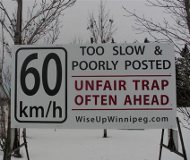Article from: www.thenewspaper.com/news/36/3688.asp
1/13/2012
Canada: Group Battles City Over Speed Trap Warning Sign
Winnipeg, Canada motorists enrage city by erecting speed trap warning sign.
 Motorists in Winnipeg, Canada became so fed up with the city's use of a confusing signage to boost the number of speeding tickets issued that they went to the expense of printing up their own speed limit warning signs. The group WiseUpWinnipeg has been needling municipal leaders over their failure to adhere by the country's legal standards for warning signs for over a year. The group finally decided to do something about it.
Motorists in Winnipeg, Canada became so fed up with the city's use of a confusing signage to boost the number of speeding tickets issued that they went to the expense of printing up their own speed limit warning signs. The group WiseUpWinnipeg has been needling municipal leaders over their failure to adhere by the country's legal standards for warning signs for over a year. The group finally decided to do something about it.
"It is appalling when citizens have to start taking public works matters into their own hands to promote vigilance against abusive public policies and enforcement," the group's co-founder, Todd Dube, said in a statement.
In the city's south end on Pembina Highway, there is a one-mile stretch of divided highway with a 60km/h (37 MPH) limit that the group argues is far too low based on the average, safe speed of traffic along the divided highway. As a result, the Winnipeg Police Service runs radar patrols for at least six hours a day, racking up hundreds of citations. WiseUpWinnipeg claims this route garners the most complaints from motorists.
The group also argues that there are not enough speed limit signs at the location, and the ones that are there violate the reflectivity and distance requirements of the Manual for Uniform Traffic Control Devices for Canada (MUTCD). As a result, drivers unaware of the limit receive an expensive ticket from the city. WiseUpWinnipeg's reflective sign prominently announced the 60km/h speed limit in large type, adding the warning: "Too slow and poorly posted, Unfair trap often ahead." This enraged local officials who took action just a few hours later.
"At 5:30pm three large trucks and a front-end loader appeared, departing at 6pm with the loaded sign" Dube said. "Isn't it ironic that the city can respond so quickly when something threatens their revenue generation yet ignore public pleas from taxpayers for over two years to adequately sign roadways."
The group insists the sign was on private property and the city had no right to take it.
 Motorists in Winnipeg, Canada became so fed up with the city's use of a confusing signage to boost the number of speeding tickets issued that they went to the expense of printing up their own speed limit warning signs. The group WiseUpWinnipeg has been needling municipal leaders over their failure to adhere by the country's legal standards for warning signs for over a year. The group finally decided to do something about it.
Motorists in Winnipeg, Canada became so fed up with the city's use of a confusing signage to boost the number of speeding tickets issued that they went to the expense of printing up their own speed limit warning signs. The group WiseUpWinnipeg has been needling municipal leaders over their failure to adhere by the country's legal standards for warning signs for over a year. The group finally decided to do something about it.